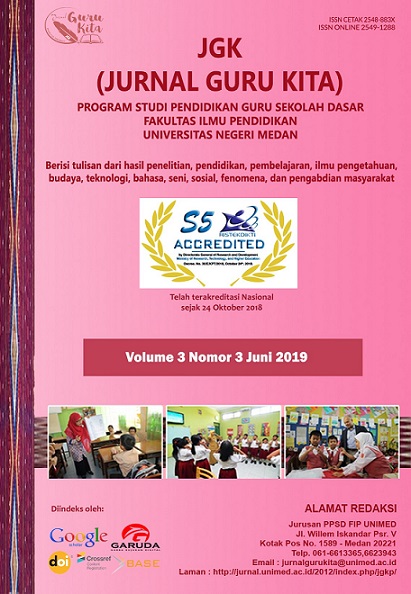THE EFFECT OF HYBRID LEARNING METHOD ON TEACHER COLLEGE STUDENTS™ READING SKILL
DOI:
https://doi.org/10.24114/jgk.v3i3.17221Abstract
Abstract: The Effect Of Hybrid Learning Method on Teacher College Students™ Reading Skill.The aims of this study is to find the effect of hybrid online learning in English course, especially on the teacher college students™ reading skills. The experimental pretest “ postest control group design method was used, where the sample of this research was taken by using cluster random sampling method. This research was focusing on teacher college students who enrolled in an Integrated English course, which divided into nine classes with total of 311 students. The selected sample consists of two classes; each class has 35 students. The experimental class was conducted using a hybrid online learning method and the control class was conducted in a conventional way. The average pretest result for the experimental class was 35.50 and 36.07 for the control class. Based on the pretest t-test result, it was known that the reading skills of the two classes was not significantly different, but after the hybrid online learning was conducted and the t-test resulted on the very significant gap between the experimental class and the control class, where the average test result was 75.07 and 65.29, consecutively. Thus, the application of hybrid online learning method was affected the reading skills of the teacher college students.Keywords: Reading skills, hybrid online learning, English, language, courseAbstrak: Pengaruh Metode Pembelajaran Hibrid pada Keterampilan Membaca Siswa Sekolah Guru. Tujuan dari penelitian ini adalah untuk menemukan pengaruh pembelajaran online hybrid dalam kursus bahasa Inggris, terutama pada kemampuan membaca siswa guru. Metode desain eksperimen pretest-postest control group digunakan, dimana sampel penelitian ini diambil dengan menggunakan metode cluster random sampling. Penelitian ini berfokus pada siswa perguruan tinggi guru yang mendaftar dalam kursus Bahasa Inggris Terpadu, yang dibagi menjadi sembilan kelas dengan total 311 siswa. Sampel yang dipilih terdiri dari dua kelas; setiap kelas memiliki 35 siswa. Kelas eksperimen dilakukan dengan menggunakan metode pembelajaran online hybrid dan kelas kontrol dilakukan dengan cara konvensional. Hasil pretest rata-rata untuk kelas eksperimen adalah 35,50 dan 36,07 untuk kelas kontrol. Berdasarkan hasil uji-t pretest, diketahui bahwa keterampilan membaca kedua kelas tidak berbeda nyata, tetapi setelah pembelajaran online hybrid dilakukan dan uji-t menghasilkan kesenjangan yang sangat signifikan antara kelas eksperimen dan kelas. kelas kontrol, di mana hasil tes rata-rata adalah 75,07 dan 65,29, berturut-turut. Dengan demikian, penerapan metode pembelajaran online hybrid mempengaruhi keterampilan membaca para siswa.Kata Kunci : Keterampilan membaca, Pembelajaran online hybrid, Bahasa Inggris, bahasa, kursusDownloads
Published
2019-06-20
How to Cite
Simbolon, N., Simanjuntak, E. B., & Purnama, M. (2019). THE EFFECT OF HYBRID LEARNING METHOD ON TEACHER COLLEGE STUDENTS™ READING SKILL. JGK (Jurnal Guru Kita), 3(3), 300–307. https://doi.org/10.24114/jgk.v3i3.17221
Issue
Section
Articles
License
Authors published with the JGK (Jurnal Guru Kita) agree to the following terms:
- Authors retain copyright and grant the journal the right of first publication with the work simultaneously licensed under a Creative Commons Attribution License (CC BY-SA 4.0) that allows others to share the work with an acknowledgment of the work's authorship and initial publication in this journal.
- Authors are able to enter into separate, additional contractual arrangements for the non-exclusive distribution of the journal's published version of the work (e.g., post it to an institutional repository or publish it in a book), with an acknowledgment of its initial publication in this journal.
- Authors are permitted and encouraged to post their work online (e.g., in institutional repositories or on their website) prior to and during the submission process, as it can lead to productive exchanges, as well as earlier and greater citation of published work. (See The Effect of Open Access)


























